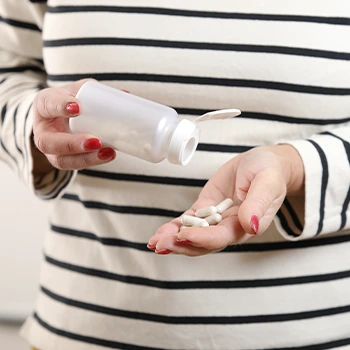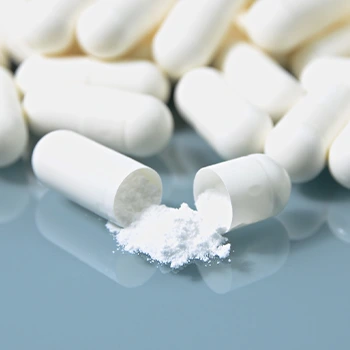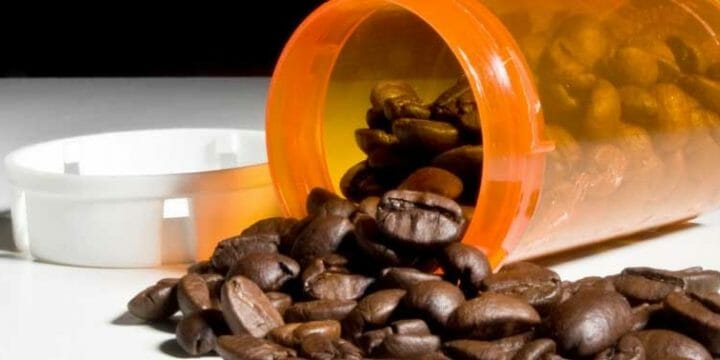The adverse consequences of using diet pills in the past have had a significant influence on the development of modern weight loss treatments.
My extensive research into the evolution of diet pills informs my guidance in selecting safe weight loss products.
In this article, I'll discuss the history of diet pills, so keep reading to learn how they have affected the way people lose weight today.
Let's begin.
Quick Summary
- Diet pills have evolved from dangerous 'fat reducers' to modern supplements with a focus on safety and natural ingredients.
- Early diet pills, such as thyroid extracts and amphetamines, were effective but posed significant health risks, including addiction and severe side effects.
- A report published by Thyroid® explains that the use of diet pills, which comprised over 1% of all prescriptions in 1988, led to stricter regulations and a shift towards safer, less addictive weight loss medications by the 1960s.
- Personally, I believe that the shift towards natural and safer diet pills reflects a positive advancement in the health industry, prioritizing consumer well-being over quick results.
A Brief History of Early Diet Pills

Back when I first started exploring the world of diet pills, I was fascinated to learn that the first diet pills, called "fat reducers" and sold under names such as "Frank J. Kellogg's Safe Fat Reducer," appeared in 1893 [1].
Since these drugs were based on thyroid extract, which increases metabolism, they were considered powerful fat loss aids [2].
However, people with normal thyroid conditions and metabolic rates have reported experiencing adverse effects, including chest pains, hypertension, irregular heartbeats, palpitations, and fatigue.
Although thyroid hormone had health risks, it remained popular as a weight-loss method up until the 1960s, according to the study published in PubMed [3].
Diet Pills From the Twentieth to the Twenty-First Century

Having navigated the evolving landscape of diet pills from the 20th to the 21st century, I've witnessed firsthand how the quest for safer weight loss solutions has intensified due to the adverse effects of earlier slimming pills.
DNP (Dinitrophenol) 1930’s
DNP (2,4-Dinitrophenol) was among the first anti-obesity drugs that were introduced to the market in 1933. It became famous as a diet pill due to its ability to boost metabolism [4].
While it was truly effective in reducing weight, soon enough it became apparent the risks outweigh the benefits, as many reports of sudden deaths started to pile on.
One of the complications was unusually high temperatures, or hyperpyrexia, indicating abnormal increases in metabolic rates.
On top of that, several consumers reported severe rashes and loss of vision and taste, based on the research published in Journal of Medical Toxicology [5].
These unexpected reports demonstrated that the drug was unsafe for human use, resulting in the drug being outlawed in the U.S. in 1938 [6].
Amphetamines 1950's

Amphetamines were first used for colds, asthma, ADHD, and to enhance alertness in soldiers during World War II [7].
In addition to its wide range of therapeutic uses, it is also effective as an appetite suppressant that helps reduce weight, according to the study published in PubMed [8].
However, it's still widely used among young people [9].
The misuse of these stimulants resulted in many people ending up with long-term side effects, which led pharmaceutical companies to come up with diet drugs that were less addictive.
Aminorex 1960's
Aminorex fumarate, another medication for treating obesity, was developed in 1965. However, many cases of pulmonary hypertension have been linked to it, which led to its withdrawal from the market in 1968 [10].
Consequently, the use of thyroid extract was revived as a weight-loss method with diuretics, laxatives, and amphetamines but eventually fell out of use due to concerns about toxicity.
Ephedra 1970's
A Danish physician used ephedrine and caffeine to treat asthma in the 1970s.
According to the National Center for Complimentary and Integrative Health, ephedrine is an herbal stimulant derived from the Ephedra plant, a low evergreen shrub with small scaly leaves that has traditionally been used to treat common respiratory problems [11].
Many researchers, however, discovered its potential for assisting people in losing weight and improving physical performance in athletes [12].
As a result of these studies, Ephedra was classified as an herbal stimulant not requiring FDA approval.
Ephedra was widely used as a weight-loss remedy, but it also came with many severe side effects, including high blood pressure, heart attacks, and seizures, and the FDA declared Ephedra to be unsafe [13].
"Ephedra [which comes from ma huang] is effective, particularly when combined with aspirin and other ingredients. But it raises blood pressure and can cause fatal heart attacks, [heart] arrhythmias, and strokes. The ads are very deceptive for ma huang regarding safety."
- Steven Heymsfield, MD, Professor of Medicine at Columbia University
Alternatives To Amphetamine 1970s-1990s

Subsequently, companies created less potent but more effective appetite suppressants than caffeine, such as phentermine, fenfluramine, and dexfenfluramine, FDA-approved between 1959 and 1996 [14].
While these anorectics are FDA-approved for short-term obesity treatment, some doctors prescribed them for more extended periods and in combination, resulting in "off-label" or unapproved drug use in the 1990s.
The combination of fenfluramine and phentermine, colloquially known as "fen-phen" [or phen-fen] became a drug craze in 1996, with many people wanting to lose weight, according to the research published in PubMed [15].
However, the widespread drug use was associated with long-term side effects, such as primary pulmonary hypertension (PPH), a condition in which blood vessels in the lungs narrow, causing unexpected deaths [16].
Because of the risks of these drugs, many researchers have begun developing safer yet equally effective alternatives based entirely on natural ingredients.
Herbal Diet Pills 2000's - Present
The 21st century has seen the emergence of various new diet pills and alternative weight loss methods, including natural appetite suppressants like coffee and medically questionable practices like laxatives.
They are also increasingly opting for recently developed slimming solutions such as prescription medicines and over-the-counter supplements, including botanical therapeutics and dietary supplements, based on the study published in PubMed [17].
Many pharmaceutical companies recognized the growing market for supplements derived from herbal root extracts, vitamins, minerals, stimulants, and nootropics. This led to the creation of tried and tested products, such as Leanbean and PhenQ, which gained a lot of attention based on expert reviews.
Today, PhenQ, which is made up of all-natural, organic ingredients such as capsicum to increase metabolism, piperine to enhance nutrient absorption, and enough caffeine to support energy production, to name a few, gets the spot as the best diet supplement brand for 2021 [18].
How Do Old Diet Pills Differ From Modern Ones?

- Composition- Early diet pills were a mix of chemicals and heavy metals, potentially causing organ damage, mental disorders, and cancer [19]. Modern ones use safer chemicals in prescription drugs and natural ingredients in over-the-counter supplements, reducing the risk of adverse effects.
- Ingestion methods - Both old and new diet pills come in forms like capsules, tablets, liquids, powders, and injectables [20]. They're taken orally or injected under medical guidance, and are safe when used as directed. It's crucial to follow the manufacturer's or doctor's instructions.
- Therapeutic use - Initially, diet pills aimed to simplify and speed up fat loss and treat conditions like insomnia and mental disorders, according to the Journal of Psychopharmacology [21]. Now, they're designed to manage weight by suppressing appetite, boosting metabolism, blocking fat absorption, or enhancing satiety through slower digestion.
Mental And Physiological Side Effects Of Old Diet Pills

Do Modern Alternatives Have The Same Side Effects As Old Diet Pills?

Modern alternatives to old diet pills generally tend to be safer but are not entirely free of side effects, reflecting a shift towards a balance between safety and effectiveness.
Prescription drugs are less harmful but can still pose health risks if misused. Supplements, while often containing natural ingredients, might have harmful interactions or unclear ingredient quantities.
Most supplement manufacturers comply with US-FDA good manufacturing practices (GMPs), ensuring quality and safety in production and packaging [26]. Products like PhenQ are also subject to third-party quality testing.
Related Articles:
FAQs
What Are Some Popular Diet Pills Today?
Some of the most popular prescription diet pills today are Bupropion-naltrexone (Contrave), Liraglutide (Saxenda), Orlistat (Xenical), and Phentermine-topiramate (Qsymia). On the other hand, top herbal supplements include PhenQ, Leanbean, and Trimtone.
Do Prescription Weight Loss Drugs Work?
Prescription weight loss drugs can work in one or more of the following ways: they suppress appetite, increase feelings of fullness, or inhibit fat absorption. Furthermore, research has shown that combining fat-burning supplements with lifestyle changes can result in a greater weight reduction than lifestyle changes alone.
References:
- https://www.independent.co.uk/life-style/health-and-families/health-news/clenbuterol-the-new-weightloss-wonder-drug-gripping-planet-zero-5332447.html
- https://www.sciencedirect.com/topics/neuroscience/2-4-dinitrophenol
- https://pubmed.ncbi.nlm.nih.gov/1841728/
- https://www.sciencedirect.com/topics/neuroscience/2-4-dinitrophenol
- https://www.ncbi.nlm.nih.gov/pmc/articles/PMC3550200/
- https://www.bbc.com/news/uk-england-44388389
- https://www.ncbi.nlm.nih.gov/books/NBK556103/
- https://pubmed.ncbi.nlm.nih.gov/15680483/
- https://www.ncbi.nlm.nih.gov/pmc/articles/PMC2377281/
- https://www.sciencedirect.com/topics/medicine-and-dentistry/aminorex
- https://www.nccih.nih.gov/health/ephedra
- https://pubmed.ncbi.nlm.nih.gov/12672771/
- https://www.webmd.com/vitamins/ai/ingredientmono-847/ephedra
- https://pubmed.ncbi.nlm.nih.gov/9543401/
- https://pubmed.ncbi.nlm.nih.gov/12737835/
- https://www.ncbi.nlm.nih.gov/pmc/articles/PMC2995984/
- https://pubmed.ncbi.nlm.nih.gov/12443874/
- https://www.ucdenver.edu/docs/librariesprovider65/clinical-services/sports-medicine/diet-pills.pdf?sfvrsn=ec335bb9_2
- https://ods.od.nih.gov/factsheets/WeightLoss-HealthProfessional/
- https://www.ncbi.nlm.nih.gov/pmc/articles/PMC3666194/
- https://www.ncbi.nlm.nih.gov/books/NBK430895/
- https://www.healthdirect.gov.au/addiction-withdrawal-symptoms
- https://pubmed.ncbi.nlm.nih.gov/11268602/
- https://www.ncbi.nlm.nih.gov/pmc/articles/PMC3550246/
- https://www.fda.gov/drugs/pharmaceutical-quality-resources/current-good-manufacturing-practice-cgmp-regulations
About The Author
You May Also Like






